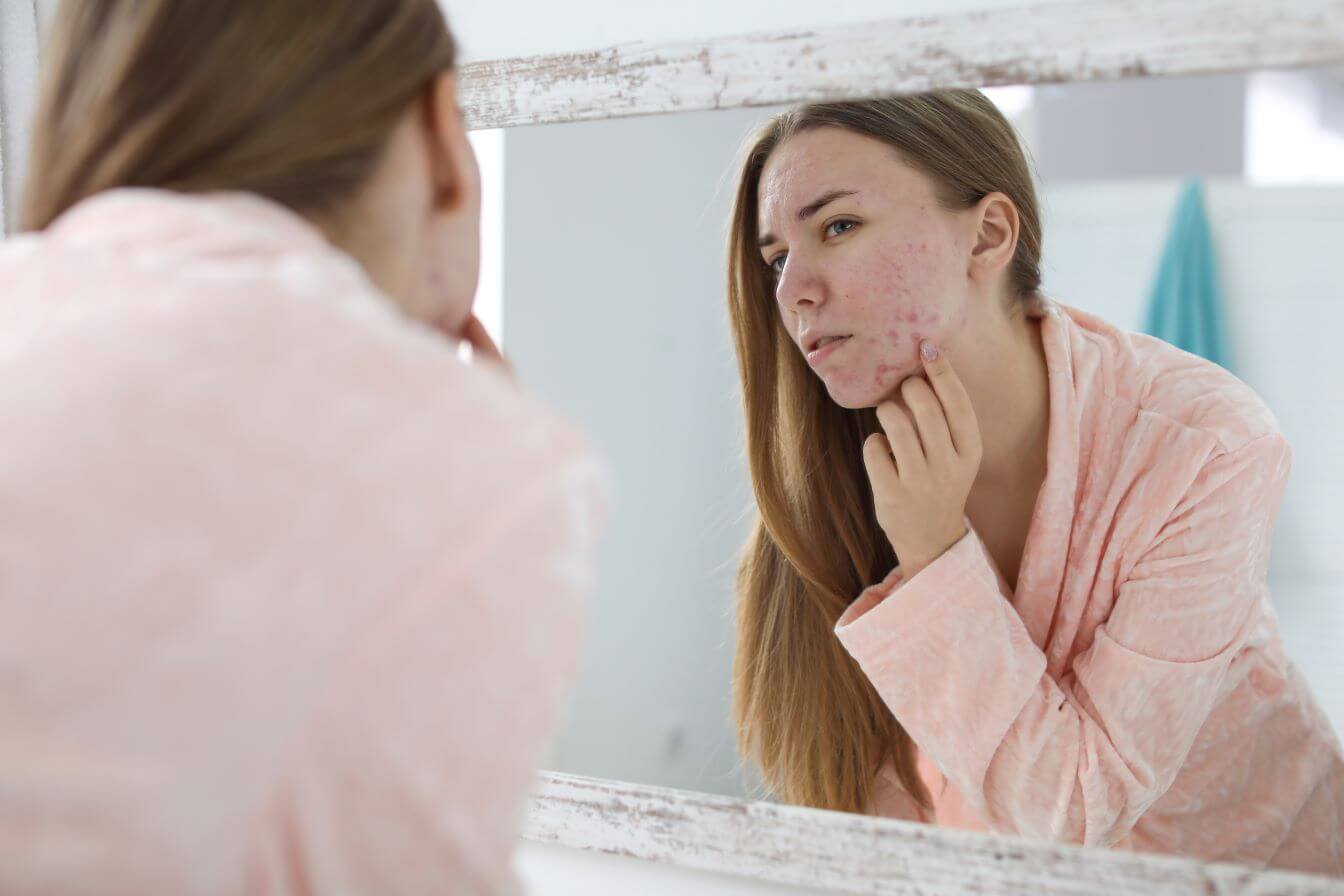Polycystic ovary syndrome (PCOS) is a disorder that encompasses a spectrum of clinical features, including cutaneous signs of hyperandrogenism (excess facial hair growth, acne), menstrual irregularity, ovarian cysts, and obesity or insulin resistance. It causes a range of symptoms that impact all aspects of health, including skin health. According to Dr. Leslie Markle of U.S. Dermatology Partners in Tyler and Lindale, Texas, “I often see women who are struggling with PCOS. The effects leave them feeling exhausted, frustrated, and not like themselves. As a dermatologist, I can’t address every symptom of PCOS, but I can help my clients develop a plan to manage PCOS-related skin symptoms. It’s an ongoing process, but I can help patients find the right skincare routine and dermatologic treatments to improve the cutaneous aspects of the syndrome.” In this blog, you can learn more from Dr. Markle about managing PCOS-related skin symptoms.
Understanding PCOS and its Impact on the Skin
PCOS is a hormonal and ovarian health condition, so it’s not necessarily obvious that this would lead to concerns that impact the skin. According to Dr. Markle, “Changing hormone levels and insulin resistance cause those who are diagnosed with PCOS to struggle with numerous skin health issues, including acne, excessive hair growth, hair loss, and less radiance.”
Specific Skin Symptoms of PCOS
PCOS may cause numerous adverse effects to the skin’s health and appearance. Everyone has a unique response to PCOS, and they will develop different symptoms. However, the four skin conditions outlined below are the most common for patients with PCOS:
- Acne – Hormonal acne that develops along the jaw, chin, and neck is extremely common for patients with PCOS. Hormonal acne tends to cause larger blemishes and those that develop deeper within the skin, especially during menstruation. This type of acne is often resistant to treatment with topical skincare products and other common treatments for acne.
- Hirsutism (excessive hair growth) – Overproduction of testosterone is another issue related to PCOS. This increase in testosterone production can lead to excessive hair growth in areas that typically have minimal or no hair, including the face, chest, back, and stomach.
- Thinning hair – In addition to causing excessive hair growth elsewhere, an overabundance of testosterone can also lead to thinning hair.
- Acanthosis nigricans – This is a skin condition common among those who struggle with insulin resistance, which is another common effect of PCOS. Insulin resistance causes hyperpigmented, velvety, thickened areas on the skin. These lesions usually develop in areas where the skin folds or rubs together, like the neck, armpits, and groin.
Managing Skin Issues with PCOS
According to Dr. Markle, “PCOS is a spectrum condition. That means people experience a variety of symptoms that can be placed along a range of severity. Because symptoms vary, treatment needs to be adaptable to ensure patients receive the best solution. Additionally, the right skincare products and routines should be developed for the individual in partnership with a dermatologist. The right skincare routine or dermatologic treatment for one person with PCOS may not help another. It’s also important to try to curb frustration if you don’t see immediate results. Consistent care over the course of several months is often necessary to achieve the desired results. A dermatologist can help you find the right treatment, but consistency is key.”
Everyone is different, but some of the common methods of managing PCOS-related skin issues include:
- Hormone targeted treatment – Birth control pills, spironolactone, finasteride/dutasteride, and other hormone treatments may be used to manage the skin and whole-body health concerns related to PCOS. Specifically, these medications help to improve acne, encourage scalp hair growth, and decrease excessive hair growth elsewhere.
- Insulin-reducing medications – If a patient is found to have insulin resistance/diabetes, these medications can help to alleviate body hair overgrowth as well as acanthosis nigricans. These medications are best prescribed with the assistance of a primary care physician or endocrinologist.
- Eflornithine creams – Can help to slow hair overgrowth. It is a topical treatment applied to the area of hair overgrowth consistently. Results are usually visible within six to eight weeks.
- Laser hair removal – This is beneficial for long-term hair removal, but only helpful for darker hair.
- Minoxidil – Available as both a topical and oral medication. This is a blood pressure medication, that when given orally in very low doses or applied to the scalp, has been clinically proven to increase hair growth.
- Other therapies to promote scalp hair growth include platelet-rich plasma injections, low-level laser therapy, and OTC supplements.
Lifestyle Changes for Healthier Skin
In addition to these treatment options, some lifestyle changes can alleviate the adverse effects of PCOS, including:
- Dietary changes – Due to the insulin resistance common for PCOS sufferers, it’s important to adjust your diet to ensure you are getting plenty of healthy fats, protein, and fiber while reducing your intake of sugars and complex carbohydrates.
- Exercise – This is shown to decrease insulin resistance and testosterone production. Additionally, regular exercise reduces cholesterol and generally improves whole-body health.
- Weight management – Excess body mass leads to an increase in androgen levels. The excessive production of this hormone contributes to many of the symptoms of PCOS.
Consulting a Dermatologist
PCOS is a complex condition, and you are likely already working with knowledgeable medical professionals to manage the associated symptoms. Adding one more specialist to the list may seem overwhelming, but the skin-related symptoms of PCOS can be difficult to manage without the support of a professional. Dermatologists can help you find the right skincare products and treatment options to deliver clearer, more healthy skin.
Schedule a Visit with a Trusted Dermatologist
When you’re ready to start tackling the skin effects of PCOS, the U.S. Dermatology Partners team is here for you. It’s simple to get started. Just take a few moments to complete our online scheduling request form. Once we hear from you, a local team member will reach out to finalize the details of your visit. We’re always happy to answer any questions you have to ensure you’re prepared for your upcoming appointment.
Find a location near me
or


